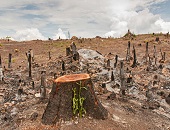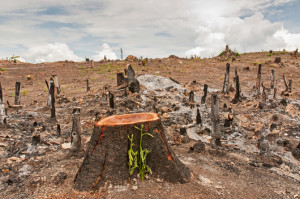“Deforestation causes severe environmental damage,” said Hilde Jervan, chief advisor of the Council of Ethics of the Government Pension Fund Global (GPFG) of Norway. The scale of deforestation of tropical forests is large, and it is occurring within areas that are ecologically important, thereby aggravating the loss of biodiversity.
The GPFG has strong ethical guidelines passed by the Norwegian Parliament in 2004. Jervan discussed these in light of the actual example of tropical deforestation. She was the second of four presenters at the May 4, 2017, webinar on Supply Chain Risk due to Deforestation sponsored by the Global Association of Risk Professionals.
Two ethical obligations underlie the written Guidelines. These are: “Future generations should benefit from the petroleum wealth” and “The Fund should respect the fundamental rights of those who are affected by the companies in which the fund invests,” she waid.
The 5-member Council of Ethics “advises Norges Bank on the observation and exclusion of companies from the Fund,” she noted, and the Council publishes all its recommendations on the Council on Ethics website.
To achieve its ethical goals, the GPFG is sometimes involved in the day-to-day business of the companies it invests in. Sometimes that requires international collaboration and contribution to the development of best practice.
Some companies are banned outright due to products (e.g. weapons manufacturing), or conduct (e.g., human rights abuses). The list of excluded companies includes Wal-mart, Daewoo, and Barrick Gold, among others.
The “conduct” exclusion has been extended to include “severe environmental damage,” she noted, as well as “acts or omissions that on an aggregate company level lead to unacceptable greenhouse gas emissions.”
Jervan summarized five important lessons learned by the Norwegian GPFG as it moved to incorporate a ethical commitments in its investment policies:
1. A dialogue should be based on facts
2. The lack of transparency is a challenge
3. Policies are not enough
4. Focus on implementation of measures and systems
5. Divestment is a reputational risk and can spur change
The GFPG of Norway is considered by many to be the beacon of environmental, social and corporate governance (ESG) investing. ª
Click here to read about the first speaker’s presentation.
Click here to view the GARP Webcast- Financial Impact of Supply Chain Risk: Zero Deforestation Case Study http://bit.ly/2ptk7Yq
The images of deforestation in this posting are from the websites slideshare.net and science.howstuffworks.com .


